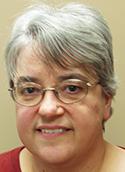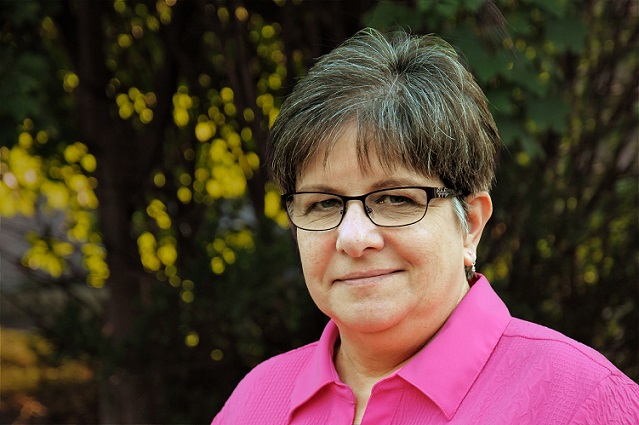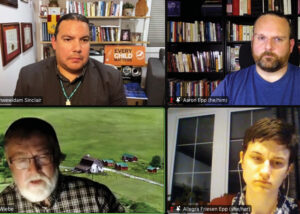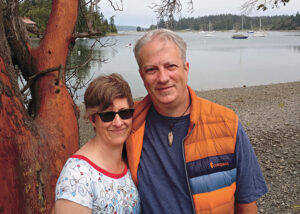Last month, a Canadian Mennonite was arrested—for following his conscience. In the tradition of our 16th-century Anabaptist ancestors, civil disobedience was an expected path. But nowadays, we don’t see things so clearly.
A recent discussion concerns the April protests at the Kinder Morgan pipeline in Burnaby, B.C., where Steve Heinrichs took part in an ecumenical protest against the construction of the pipeline. He was arrested on criminal and civil charges for contempt of an order prohibiting protests at the site. (See “Mennonites join in Kinder Morgan pipeline protest.”)
Heinrichs serves as the director of Indigenous-Settler Relations for Mennonite Church Canada. He says he heeded a call from local Indigenous groups to stand with them in protest. In a Facebook post he wrote, “I was arrested today along with fellow spiritual leaders in defence of Indigenous peoples’ inherent right to free, prior and informed consent; their right to protect and maintain their relationships to traditional territories and waterscapes . . . ; their right to say no to fossil fuel expansion in this time of ecological crisis.”
There are at least two main points of discussion:
1. Is the pipeline the best way to address the country’s ongoing demand for fossil fuels? Some local Indigenous communities have signed deals giving approval for the pipeline, seeing their financial survival closely tied to its success. Other groups see the certain degradation of their lands and fear the risk of disastrous oil spills.
The same disagreement happens within our own circles. That’s understandable, since some in our churchwide community work in jobs related to the oil industry while others labour on behalf of environmental concerns.
2. Should a person working on behalf of the nationwide church participate in a public protest like this? People have asked whether Heinrichs was representing MC Canada in an official capacity or whether he was there as an individual. A fair question.
Over the past several years, our nationwide body has championed the cause of justice for Indigenous peoples. At the July 2016 assembly, delegates passed a resolution to repudiate the Doctrine of Discovery, a viewpoint that has long been used to justify dominance over Indigenous peoples.
Furthermore, in the restructuring of MC Canada that happened last fall, delegates affirmed that reconciliation between Indigenous and non-Indigenous people should be a nationwide priority. The hope was that our denomination would continue speaking nationally on issues related to our Indigenous neighbours. Heinrichs is widely respected, both within our denomination and beyond, for his strong commitment to justice for First Nations people and for his ability to inspire others to participate in the cause.
At its May 5 and 6 meetings, the MC Canada Joint Council had conversation about the B.C. protest. A written report states, “While there is a difference of opinion regarding the resulting arrest of Heinrichs, the Joint Council remains committed to the ministry and the statements made by the church in the past.” This is not quite an endorsement of his civil disobedience, but it is a reminder that we as a church see advocacy as part of our reconciliation efforts.
Where to from here? While we recognize the complexities of this issue, let’s take seriously the ones who were in this land before our ancestors got here. Let’s keep listening and talking, and taking action as our conscience calls us. And whatever “side” we’re on, it is good to remember that our own habits of consumption are part of the problem. Clearly, this conversation is not finished.
Introducing Barb Draper, Editorial Assistant
 Barb does some writing as well as proofreading, indexing and compiling the lists of books and resources for Canadian Mennonite. One of her passions is local Mennonite history, and she serves on the board and edits the newsletter of the Mennonite Historical Society of Ontario. As well as writing plays, she has penned a book explaining Old Order and other Mennonites in her community. She lives in Elmira, Ont., with her husband Roy, a retired English teacher, and attends Floradale Mennonite Church. They have two grown-up sons.
Barb does some writing as well as proofreading, indexing and compiling the lists of books and resources for Canadian Mennonite. One of her passions is local Mennonite history, and she serves on the board and edits the newsletter of the Mennonite Historical Society of Ontario. As well as writing plays, she has penned a book explaining Old Order and other Mennonites in her community. She lives in Elmira, Ont., with her husband Roy, a retired English teacher, and attends Floradale Mennonite Church. They have two grown-up sons.








Leave a Reply
You must be logged in to post a comment.